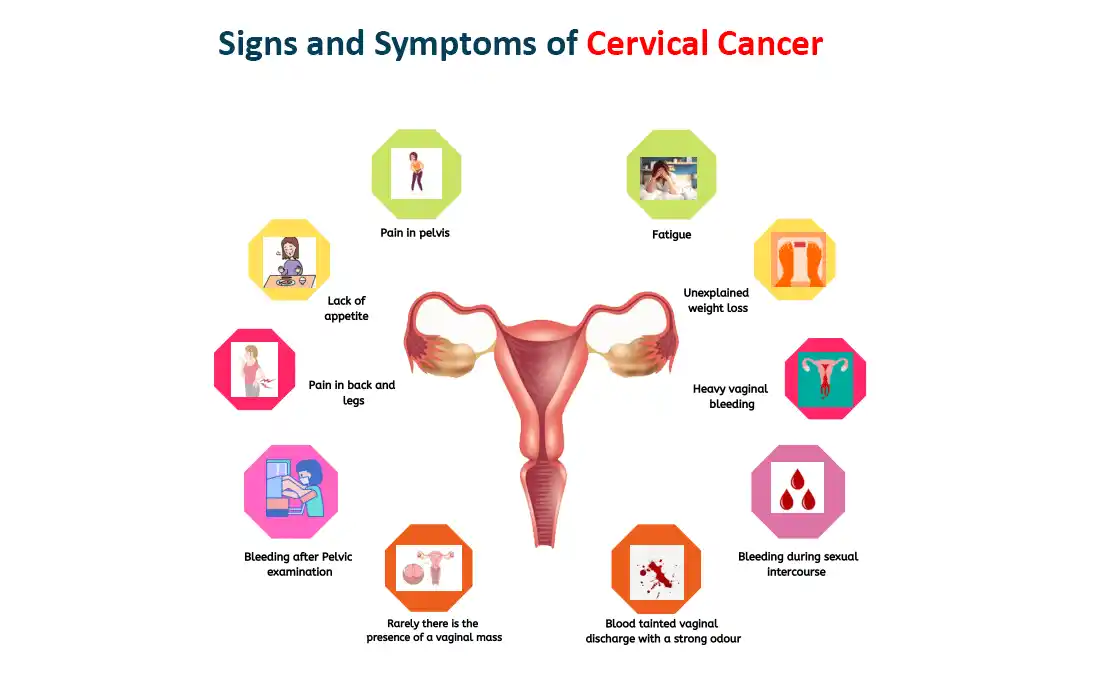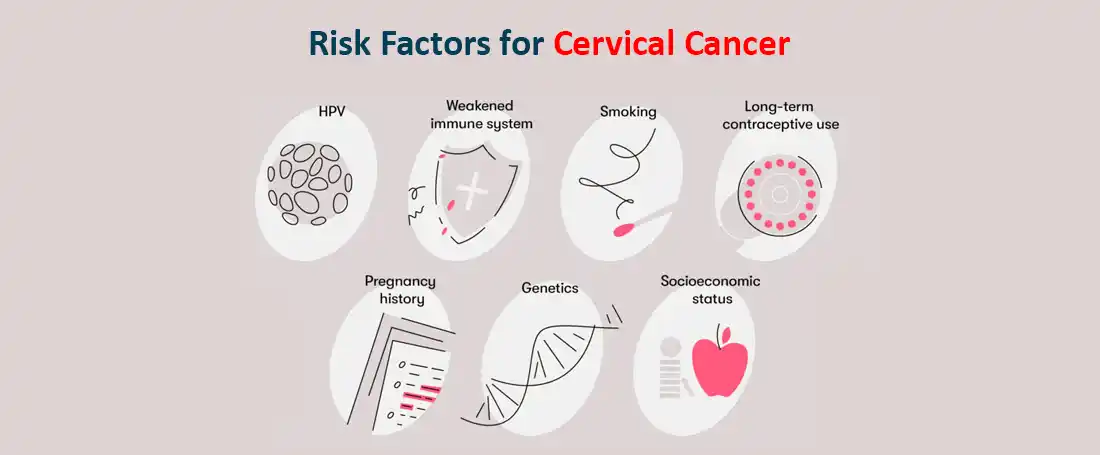
Cervical cancer is a very common type of gynaecological cancer in India. It's a cancer that develops in a woman's cervix (the entrance to the womb from the vagina).
Cervical cancer is a very common type of gynaecological cancer in India. It's a cancer that develops in a woman's cervix (the entrance to the womb from the vagina).
Every woman in the world has a potential risk of developing cervical cancer. It's still taboo for many women in India, they hesitate to discuss health issues and medical advice. Most of the time cancer of the cervix shows no symptoms in the early stages. Hence regular health check up is important for a healthy and disease free life.
It's important to know the basic symptoms, causes and treatment modalities of cervical cancer. Abnormal bleeding from the vagina like- after or during sex or after menopause doesn't always mean cervical cancer, so it's important to investigate the source and cause of bleeding.
Diagnostic tests play a crucial role and help to determine the cancer - how serious it is, stage and guide the doctor how best to treat it!
A woman can reduce the risk by having screening of cancer and by receiving a vaccine that protects against HPV infection.
If a person is diagnosed with cervical cancer, it can be treated with multiple approaches like surgical, chemotherapy, targeted medicines therapy and radiation therapy.
What Are the Signs and Symptoms of Cervical Cancer?

It is essential to pay attention to any changes in your body and seek medical advice if you notice something unusual.
As we discussed earlier there are no symptoms in early stages of cervical cancer.
However, in advanced stages, most common symptoms of cervical cancer are:-
- Pelvic pain
- Pain during intercourse
- Vaginal discharge which may be heavy and foul smell
- Vaginal bleeding after intercourse, between periods or after menopause
- Menstrual bleeding which is heavier and last longer than usual
- Constant fatigue
- Weight Loss
What Are the Causes of Cervical Cancer?
Cancer begins when healthy cells of the cervix start mutating and multiplying in an uncontrolled manner. As they continue to multiply, an increased mass of abnormal cells form a tumour. This tumour may spread (metastasis) to other parts of the body.
What Are the Risk Factors for Cervical Cancer?
Risk factors of cervical cancer are:-

- Human papillomavirus (HPV) infection
- Multiple sexual partners
- Smoking
- Prolonged use of birth control pills
- Other sexually transmitted disease (STD’s)
- Lower immune status (HIV)
How is Cervical Cancer Diagnosed?
Prevention is better than cure. So regular screening is good for prevention in high risk individuals. Pap smear test can detect the abnormal cell changes in the cervix before they turn into cancer.
Ganesh Diagnostic and Imaging Centre is the best diagnostic centre offering a wide range of diagnostic tests under one roof. While choosing the best diagnostic cervical test, doctor may consider the signs and symptoms and for confirmatory they may advice the following tests:-
- Pap Smear Test
- Human Papillomavirus (HPV) typing test
- Biopsy
- X-Ray
- CT scan
- MRI
- PET-CT Scan
- Biomarker testing of the cervical cancer
Support and Awareness for Cervical Cancer
Dealing with any type of cancer can be challenging, but remember you are not alone. Seek support from loved ones, join support groups and stay informed about the latest developments in cervical cancer research and treatments.
Conclusion
At Ganesh Diagnostic And Imaging, we emphasise the importance of regular checkups and screening. Remember early detection saves life. Don't hesitate to reach out to us for any concerns or to schedule a screening.
Stay healthy, stay informed!
Ganesh Diagnostic And Imaging Centre, we are proud to offer:-
- Free Ambulance Service
- Free Home Sample Collection Service
- 24X7 Availability
- Online reports
- Highly accurate and timely results
- Positive patients’ feedback
- Very helpful staff
- Online Patient facility
These services are part of our commitment to making it more accessible, convenient and patient friendly for everyone in our community.
For any query, we offer free online consultation with our experienced doctors.
Frequently Asked Questions Related Cervical Cancer
What Are Risk Factors of Cervical Cancer?
- Smoking tobacco
- Multiple sexual partners
- Indulging in early sexual activities
- Weak immune System
- HIV and HPV infections
- Consumption of miscarriage prevention medicine i.e diethylstilbestrol.
How to Prevent Cervical Cancer?
These are the following factors that reduce the risk of cervical cancer:-
Get HPV vaccine- HPV vaccine can reduce the risk of developing cervical cancer.
Routine PAP smear test- Pap smear test can detect the precancerous condition of the cervix. So that precancerous conditions can be monitored and treated in early stages.
Practise safe sex-
Avoid smoking
Is Cervical Cancer Treatable?
Treatment prognosis of cervical cancer depends on the stage of cancer. Cervical cancer can be curable when treated in early stages.
Are There Any Complications of Cervical Cancer?
It's quite common to develop complications in women with cervical cancer. Complications of cervical cancer are- Vaginal bleeding, frequent urination, severe bleeding which may occur which is life threatening or may cause kidney failure.
Complications may also be related with treatment like radiation therapy, chemotherapy and surgery.
How Long Can a Person Live With Cervical Cancer?
91% of women with cervical cancer survive five years when the disease is detected early. The 5-year relative survival rate for cervical cancer patients who receive a diagnosis after the disease has spread to adjacent tissues, organs, or regional lymph nodes is 60%.
How Does Cervical Cancer Affect Daily Life?
Receiving a cancer diagnosis can have social and emotional repercussions. This could entail controlling your stress level or coping with a range of emotions, including anger, worry, and sadness. People can have a hard time telling their loved ones how they really feel sometimes.
Do Periods Stop in Cervical Cancer?
If you miss your period or it starts later than usual, there are several possible causes for this (including the possibility that it's just our bodies' quirky ways!). However, it's typically not an indication of cervical cancer. More bleeding, not less, is typically a symptom of cervical cancer (particularly after intercourse).
Can MRI Diagnose Cervical Cancer and Its Staging?
MRI's function in the staging and monitoring of the cervical region.
When evaluating myometrial invasion depth and cervical involvement preoperatively, MRI is the most effective method; these factors are correlated with tumour grade, the presence of LN metastases, and overall survival.
What Are the Stages of Cervical Cancer?
The stages of the cancer tells about the size and cancer spread. Cancer cells are divided into different stages:-
- Stage 1- Cancer cells are present in the neck of the cervix.
- Stage 2- Cancer is spread from the cervix to the adjacent surrounding tissue.
- Stage 3- Cancer has spread from the cervix into the structures around it or into the lymph nodes in the pelvis or abdomen.
- Stage 4- Cancer has spread to the bladder or back passage (rectum) or further away.
What is the Survival Rate of Cervical Cancer?
Only 44% of people are diagnosed at an early stage of cervical cancer which shows good prognosis. If cervical cancer spreads to the surrounding area then the survival rate is 5 years in 59% of the cases. If cancer spreads to distant part than survival rate is inly 17%
What Are the Most Common Types of Cervical Cancer?
Two most common types of cervical cancers are-
- Squamous cell carcinoma
- Adenocarcinoma
What Are My First Signs of Cervical Cancer?
In the early stage it remains unnoticed. Although early signs of cervical cancer are-
Unusual bleeding from vagina, Vaigina discharge which is heavy and foul in smell. Pain may occur in the pelvis region.

















